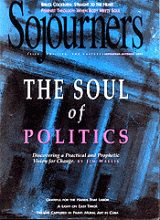1994 thus far has been a momentous summer. The ad-friendly Woodstock reunion is upon us, the impending (at the time of this writing) baseball strike is the talk of the sports world (replacing O.J. and the World Cup),
and rockers are testifying before congressional committees.
Grunge for Justice
n On August 13 and 14, all eyes (or so Pepsi-Cola would have us believe) will be pointed toward Saugerties, New York, a site 50 miles from the original Woodstock event. And the warm-up has been going on for years. Behind the scenes there have been struggles over product licensing (including the "official" event guitarMartin, if you want to know), movie and soundtrack rights (Time Warner), and the actual site to use (the original spot just wasnt good enough). But with all that now settled, the promoters can focus on the most important aspect of the eventthe profit.
Tickets for this historic re-event were sold through Ticketmaster in bundles of four, with each ticket costing $135plus the infamous service charge. Better yet, travel companies were selling packages that included airfare, sleeping accommodations, and a ticket. From the West Coast a fan could buy this package for $799. And to think that tickets to that first Woodstock were only $18 for three days of fun in the occasional sun.
This same $18 price became the battleline between two giants in the music industry this summer. Hotter-than-hot Seattle (where else?) grunge band Pearl Jam put the question of commercialism on the summer fanzine tour map of topics. Hoping to keep ticket prices more affordable, Pearl Jam dared to face up to the Beast of the musical apocalypse, Ticketmaster. With astonishing courageand good marketing sensethis quintet has potentially tossed their future into the mosh pit by rocking the industrys boat.
Read the Full Article
